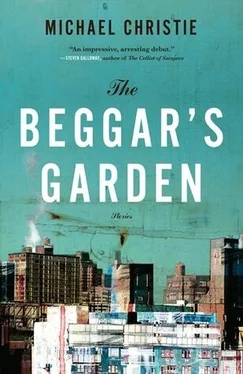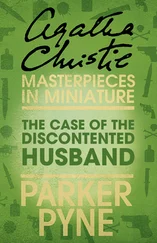The structure itself was a rickety assemblage of rotting boards with two barn-style doors that swung outward. Sam had never made good on the promise to both Anna and himself to undertake its renovation. It held their bikes, wicker garden chairs, rubberized bins of what remained of Cricket’s childhood memorabilia, and an arsenal of tools he’d got when his father had passed — tools his father hadn’t much used either. Black mould speckled the exposed rafters above, where a coiled badminton net, Cricket’s crutches from four years ago, and Sam’s old hockey equipment had found permanent lodging. The garage had always been the storehouse for the scraps of their life together, and Sam considered it fitting that it was here he’d sought refuge.
Earlier that night, he’d discovered some freeze-dried meals they’d purchased for a kayaking expedition in the Yukon that had never got booked. He boiled chicken à la king in a foil bag over a camping stove and spooned it from a dented tin plate. While he ate he listened to hockey on the radio. The stream of the announcer’s play-by-play kept his mind from betraying him, as it did without fail during any manner of silence. His power supply was an orange extension cord running to the side of his house — a four-bedroom built in 1912 that he and Anna had gutted and renovated at great cost. It had become a place Sam could not tolerate. Mostly, he did not care for the linger of his family’s scent, in the towels, the carpet, even his own clothes, which served only to feed the dark ruminations that dredged his mind without mercy. The house had always felt much too large, and now, after he’d locked all its doors and dropped his house key down the manhole out front, it was tomblike, monolithic, laying a wide, grim shadow over his yard.
The ordeal had commenced benignly enough. Anna, a casting director who’d just wrapped a gruelling sci-fi film that had gone way over budget, had taken Cricket to her parents’ in Calgary for spring break so they could ski at nearby Banff. Sam was to enjoy some “self-time,” as Anna would say. The visit was first extended by a few days when there was a heavy snowfall, then by a week because Anna’s father had experienced another heart arrhythmia. Sam filled most of this time by working late at the bank, spearheading a new fraud initiative involving digital fingerprinting that he knew would never get the funding to clear the boardroom. It wasn’t until she’d called to inform him of her plan to stay another two weeks that Sam knew something was amiss.
“I thought you had that Jeep thing this month?” he said.
“The dollar the way it is, they’re shooting it in Detroit. Oh, that reminds me, can you call Cricket’s school? I lost the number.”
Sam said he would, then suggested he book a few days off and fly out for the weekend.
“Oh, don’t bother, we’re so busy here …,” she said, and when Sam insisted, her voice congealed. “Sam, this is hard to say, but I think I need you there right now.”
Sam fell silent. He could hear some electronic debris on the line, a distant titter, and he wondered whose provider was responsible.
“I’m sorry,” she said, “but we’ve just been so isolated in Vancouver. And I suppose I’ve been reconnecting with my family. I do have a family, remember?”
“The same oppressive one you were trying to escape by dragging us out here? Or have they been swapped out?”
There was a moment of quiet, during which Sam fought to corral his breathing.
“Sam, I’ve begun to suspect that either you or I is horribly unhappy,” she said next, “and I’m afraid it may be both.”
“I was happy,” he said, feeling simultaneously witty and petty for the emphasis.
They’d been married eleven years, and Sam had long ago regretfully concluded they were a disagreeable species of person, fundamentally speaking, a reality he’d resigned himself to and was willing to endure. The years had cruelly revealed in Sam and Anna the very qualities they’d so zealously sought to conceal with copious amounts of false self-advertisement on those pivotal first dates: she, controlling and anxious; he, over-critical and distant. But Sam had always secretly believed that the death of their embellished fictional selves was inevitable and, ultimately, forgivable. They were things built to dazzle, then to be shed and to fall away like the fuel tanks of a space shuttle.
So it had mustered in him an acute sense of betrayal when she disturbed this functional truce to declare their unhappinesses. Yet even during the spiteful salvoes he made on her memory nightly, he couldn’t dissuade himself from admiring her bravery.
“Sam,” she said in a broken voice after a few hollow seconds, “it’s simply that I … I’ve realized I’ve become someone that I think I may loathe.”
“Can you put Cricket on?” Sam said, circling the kitchen island with brisk strides.
When Anna informed Sam that Cricket was out crosscountry skiing with her cousins, Sam, more sternly than he’d have liked, took it upon himself to offer an itemized verbal summary of the errors she was right then committing in arriving at this decision. Though outwardly independent, she was at heart an impressionable woman, vulnerable to another’s interpretation of her feelings, and Sam had always secretly feared it had been this ability of his to articulate how she felt, and what she needed to do to fix it, that had drawn her to him and kept her there. And for the bulk of that night, he lay in their bed reviewing his points, each of which was unquestionably true, then concluded that perhaps it was their overwhelming cumulative effect that had caused her to hang up with a delicate, jaw-like click.
The raccoons must have moved on, because when Sam’s clock radio went off it lifted him from a fitful sleep. It was a Monday. He rose with a lead weight in his body and stood at the small window that overlooked the garden. It already bore signs of her absence: weeds sprung amidst the vegetable beds; the rhododendron petals gone the nauseated hue of tobacco leaves; a defeated wither over everything. She’d always neglected to instruct Sam on the operation of the system of taps feeding the intricate vasculature of punctured hoses that wound about the yard. Despite the feminist outpost she dutifully occupied after the second bottle of wine at dinner parties, she was a woman who believed in household domains; she stalked the kitchen, laundry room, and garden like a wolverine and was determined to keep their secrets from him. Regardless, he’d begun to enjoy the garden’s slow ruin and found himself compulsively checking forecasts on his phone.
He unplugged the clock radio from the extension cord, plugged in his shaver, and held the buzzing instrument to the wilds of his sleep-puffy face. He coughed down a few pieces of ragged multigrain bread, went out to his car, and pulled one of the dry-cleaner bags from the trunk. After moving out, he’d gone and bought five cheap suits, one for each day, the boxy polyester kind his father had worn. Relieved of the counterbalance of family, Sam’s life had tipped wildly into the realm of his office. He was a director in the fraud department of a major bank, his main responsibility being to oversee and ever-update a byzantine formula through which each transaction was run, designed to detect any manner of banking irregularity. He’d heard from the old-timers that his job used to entail tracking down real flesh-and-blood con artists, cheque kiters, and crooked tellers. Now nothing near detective work was involved; if the formula flagged any statistically anomalous event, a follow-up was made by call-centre employees from a contractor in New Brunswick. Ones that didn’t check out, the card was cancelled and the money replaced; ones that did, the card was reactivated. In either case the formula was adjusted accordingly.
Читать дальше












